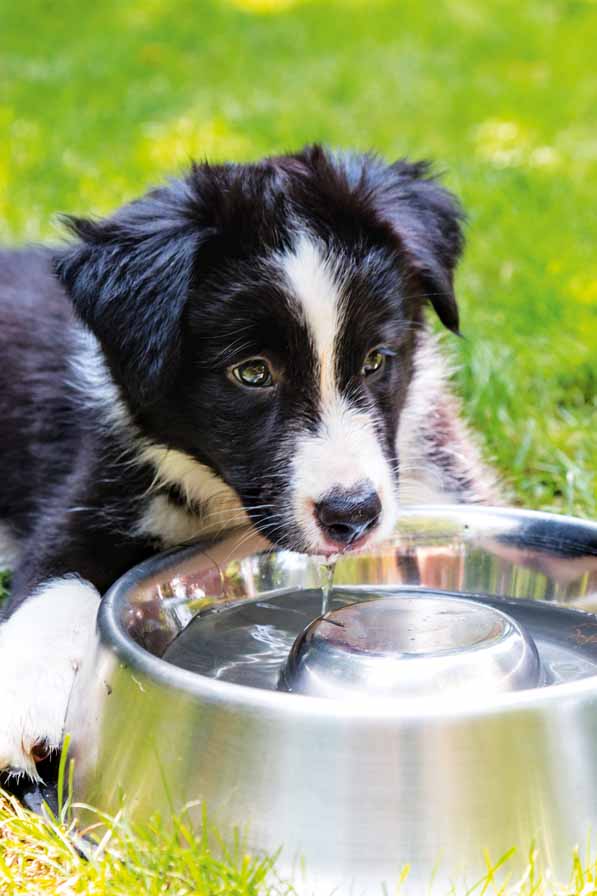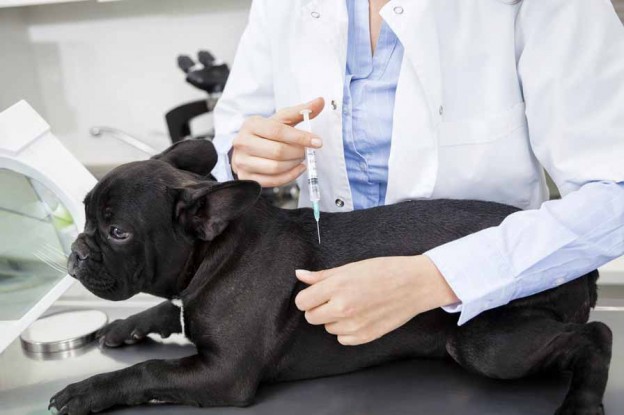Acupuncture for dogs is an age-old treatment capable of helping with many of their common ailments. Rachel Belshaw takes a closer look at this holistic therapy.
The history of veterinary acupuncture dates back more than 4000 years, with its roots China. Australia adopted this alternative treatment decades ago for use in both domestic and exotic animals.
Additionally, the World Health Organization (WHO) has officially recognised acupuncture as an effective treatment for many conditions and diseases. Usually pain-free, this therapy can be used to treat many common and uncommon ailments in dogs, and can be used as a sole treatment or alongside conventional medicine to obtain an optimum result.
What is acupuncture?
Acupuncture is the use of thin needles applied to various points of the body, producing biological and physiological stimulation. This process is based on the principle that the life energy that flows from organs can be disturbed by ill health or injury.
Known as Qi or Chi, this flow of energy can be restored by inserting thin needles into certain points along the energy path. Acupuncture has been noted to be particularly useful in the relief of pain, and can be used in the treatment of almost any disease or condition.
Acupuncture is an ancient procedure used in Traditional Chinese Medicine, which often uses herbs, diet and exercise to assist the body in healing, says Dr Megan Semple, a veterinary acupuncturist of seven years.
Kristine Edwards, a qualified animal physiotherapist of 20 years, who has been practising acupuncture on animals for 10 years, agrees adding that acupuncture aids the strengthening of the immune system. Acupuncture is a holistic treatment and helps to promote healing, not just pain relief, as some may believe,” she tells Dogs Life.
According to Semple, treatments stimulate nerves, increase blood circulation, relieve muscle spasms and cause the release of hormones. Treatments release hormones, such as endorphins (one of the bodys pain-control chemicals) or cortisol (a natural steroid). However, cortisol is less-commonly aimed for and lots of other, more beneficial, hormones are released first, she says.
Commonly treated conditions
Semple says acupuncture can be used to treat a wide range of conditions, but about 70 per cent are musculoskeletal. Due to this, she says she finds a higher representation of particular breeds.
This may be because the breeds are more common or the injuries are more common in them, but we do see lots of Labradors, German Shepherds, Collies and Terriers of all sorts, as well as Greyhounds, she says. The most common conditions we see are cruciate tears, back disease or pain, hip dysplasia and elbow dysplasia. Other recent cases I have had great results with include kidney failure, seizures and lick granulomas (skin lesions). Acupuncture is designed to realign the body, so it can help a wide range of diseases and is exceptionally good for pain control and healing.
Acupuncture can also be helpful in treating paralysis, asthma, gastrointestinal disorders, head trauma, respiratory problems, urinary disorders, dermatological problems and certain reproductive problems.
Edwards says arthritis, injuries, neck and back pain can all be treated with acupuncture and it can also be helpful post-surgery.
Treatment
Treatment sessions are usually between five and 20 minutes duration, depending on the dogs tolerance and condition, Edwards explains. Usually painless, the patient will have a small awareness as the needles enter. The most difficult task during the session is keeping the dog relatively quiet and still.
Most conditions cannot be cured with just one session, but it is possible to see improvement from one visit, she says.
Semple agrees, adding, Most conditions involve a course of treatments, three to six treatments, or long-term management for conditions such as hip dysplasia. Acupuncture is often used to assist in the management of long-term issues that cannot be cured, so aiming for monthly revisits to maintain a comfortable lifestyle is usually the goal.
Generally, acute problems require less time and frequency of treatment in chronic cases. For example, explains Semple, an acute sprain may require only one treatment, whereas more severe or chronic ailments may require multiple treatments. A positive response is often seen after the first to third treatment in chronic cases. Once an optimum response is achieved, treatments are tapered off so the greatest amount of symptom-free time elapses between them.
A physical examination should always take place before acupuncture treatments are conducted. This is usually conducted over two levels; the standard, Western medical examination (one your vet would have already provided) followed by a Traditional Chinese Medicine (TCM) examination. During the TCM examination, pulses and special alarm points on the body are checked to assist in isolating the link between different changes in the body.
Semple says acupuncture does not always involve needles. Other forms include laser, aquapuncture (liquid needling) and gold beads. As a general rule, very few drugs are used, but acupuncture is often safely used in conjunction with Western medicines to provide the most comfort and best possible outcome, she says.
When to avoid acupuncture
According to both Semple and Edwards, there aren’t any dangers for canine patients receiving acupuncture treatments. Both do, however, advise seeking out a qualified, competent practitioner to reduce any risks and obtain appropriate advice before embarking on a treatment plan.
While there aren’t any immediate dangers involved, older patients can find the remedy very tiring, and it may not be the most appropriate therapy for certain conditions. It is also advised not to treat patients with open wounds or infection. These instances can be advised by your veterinary acupuncturist.
The alternative approach
While there is a lot of research and science behind why acupuncture works, the most important thing to remember is that it is a natural treatment. The results can be quite amazing and it has no risk of major side effects, unlike many conventional medications – for example, liver or kidney damage brought on by the use of an anti-inflammatory.
There is very little to lose by giving it a try, and I have seen many dogs that have been saved by the use of acupuncture, Semple says.







